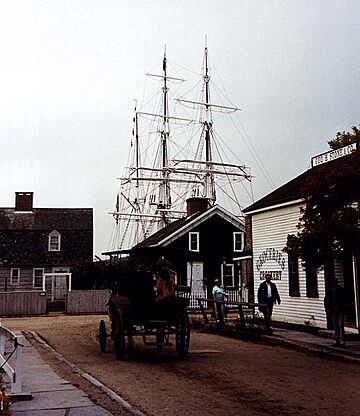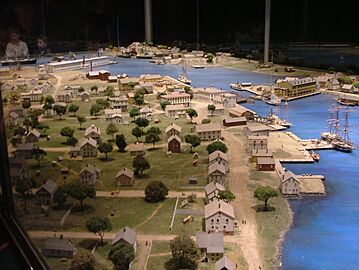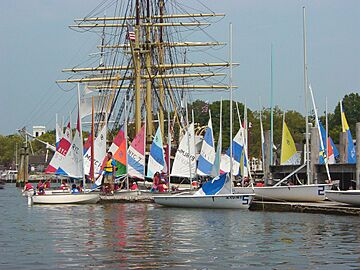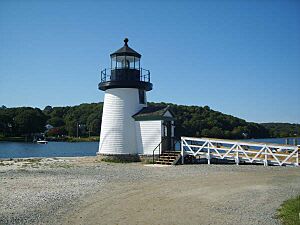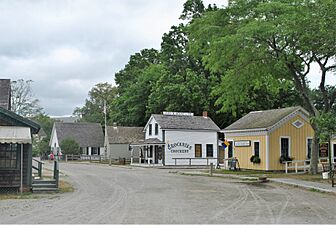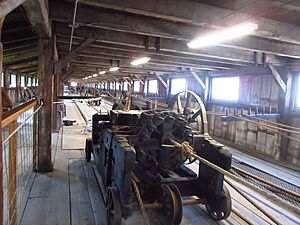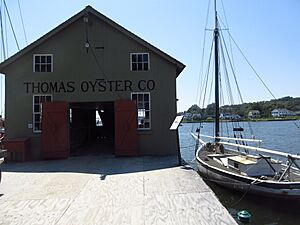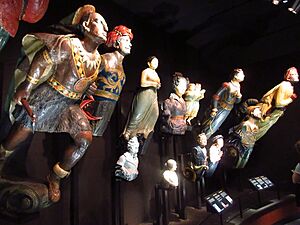Mystic Seaport facts for kids
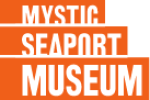 |
|
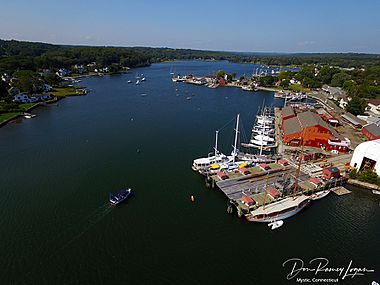
View from the Mystic River Estuary
|
|
| Established | 1929 |
|---|---|
| Location | Mystic, Connecticut |
| Type | Maritime museum • history museum |
| Visitors | 250,000 (2023) |
| Public transit access | |
The Mystic Seaport Museum is a super cool place in Mystic, Connecticut. It's the biggest maritime museum in the whole United States! Imagine a huge area, about 19 acres, filled with old ships, boats, and a whole village that looks just like it did in the 1800s.
More than 60 historic buildings have been moved here and carefully fixed up. These buildings show what life was like when sailing ships were super important. Lots of people visit the museum every year to explore this amazing piece of history.
Contents
A Look Back: How the Museum Started
The museum began in 1929. It was first called the Marine Historical Association. One of the people who helped start it was Mary Stillman Harkness. Her grandfather, Thomas Stillman Greenman, was a famous shipbuilder in Mystic. Mary gave the museum some land that used to belong to her grandfather. Later, she even donated his house!
Mystic Seaport was one of the first "living history" museums. This means it has buildings and people who show you how things were done long ago. The museum became really famous in 1941 when it got the Charles W. Morgan. This ship is the only wooden whaling ship left in the world!
In 1955, a professor named Robert G. Albion started a special summer program here. It helps older students learn even more about maritime history.
What You Can See and Do at the Seaport
The Henry B. du Pont Preservation Shipyard is a very important part of the museum. Here, skilled workers use old tools and methods to fix and take care of the museum's historic ships. This includes the famous Charles W. Morgan.
A special replica of the ship La Amistad was built right here in the shipyard. It was finished in 2000. In 2007, Amistad sailed on a long journey across the Atlantic Ocean. This trip helped people remember the 200th anniversary of the end of the slave trade in Great Britain.
Exploring the 19th-Century Village
The village at Mystic Seaport shows you what a busy seaport was like in the 1800s. You can see all kinds of shops and businesses that helped build and run sailing ships. There's a chandlery (where they sold ship supplies) and a sail loft (where sails were made). You can also find a ropewalk (where ropes were twisted) and a cooperage (where barrels were made).
Other buildings include a shipping agent's office, a printing office, and a bank. There's even The Spouter Tavern, which serves food during certain times of the year. Each building shows you what it was used for and displays old tools or items. For example, the nautical instrument shop has sextants and old clocks that sailors used. At the cooperage, you can watch how barrels were put together.
-
A small model of Mystic, Connecticut as it looked around 1870.
Cool Exhibits and Learning
Other buildings at the museum have even more exhibits. You can see a huge model, 40 feet long, of the Mystic River area from around 1870. It's super detailed, showing everything from that time! Another building has a collection of amazing carved ship figureheads. These are the cool statues that used to be on the front of old sailing ships.
The Treworgy Planetarium is also at the museum. Here, you can learn how sailors used the stars to find their way across the ocean.
Fun on the Water
If you want to get out on the water, you can take sailing lessons! You can also go for rides in different historic small boats. These rides give you great views of the big historic ships docked at the museum. The museum also has a music program that features sea shanties. These were work songs that sailors sang while doing their jobs on ships.
The Seaport also has a huge library for people who want to do research. Plus, they work with Williams College to offer a special program for college students to study maritime history. They also have sailing and history classes just for kids in the area!
Famous Ships: National Historic Landmarks
Four of the vessels at Mystic Seaport are so important that the United States government calls them National Historic Landmarks. This means they are very special parts of American history!
| Vessel | Image | Type | Length | Built | What Makes It Special |
|---|---|---|---|---|---|
| Emma C. Berry | 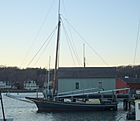 |
well smack | 39 ft | 1866 | The Emma C. Berry is the last American "well smack" left. These boats had a special compartment filled with water to keep fish alive! She joined Mystic Seaport in 1969 and became a National Historic Landmark in 1994. |
| L. A. Dunton | 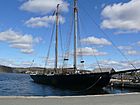 |
fishing schooner | 123 ft | 1921 | The L. A. Dunton is one of the last big fishing boats that used only sails. She fished in New England and off Newfoundland for many years. Mystic Seaport got her in 1963 and made her look just like she did originally. She became a National Historic Landmark in 1993. |
| Charles W. Morgan | 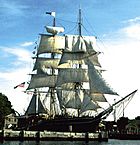 |
whaler | 113 ft | 1841 | The Charles W. Morgan is a whaling ship that sailed for 80 years! She is the only wooden whaling ship still around from the 2,700 that once existed in the U.S. fleet. On her deck, you can see huge pots used to turn blubber into whale oil. She came to Mystic Seaport in 1941 and was named a National Historic Landmark in 1966. |
| Sabino | 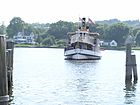 |
island steamer | 57 ft | 1908 | The Sabino is a small steamboat that burns coal. She is one of only two such boats still around in the United States. Mystic Seaport got her in 1974. She still operates today, making her America's oldest regularly running coal-powered steamboat! She became a National Historic Landmark in 1992. |
Other Cool Vessels to Explore
Mystic Seaport has many other amazing boats and ships in its collection. Each one has its own unique story!
| Vessel | Image | Type | Length | Built | What Makes It Special |
|---|---|---|---|---|---|
| Annie | 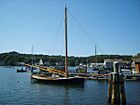 |
sandbagger sloop | 28 ft | 1880 | The Annie was built for racing! She was the very first boat donated to Mystic Seaport in 1931. She was carefully restored in 2004. |
| Breck Marshall | 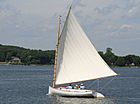 |
cat boat | 20 ft | c. 1900 | The Breck Marshall is a copy of the catboats used for fun and fishing around 1900. In warm weather, you can take a sightseeing ride on her on the Mystic River. |
| Brilliant | 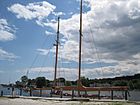 |
auxiliary schooner | 61 ft | 1932 | The Brilliant was built as a super-fast ocean racing yacht. She once crossed the Atlantic Ocean in just over 15 days! During World War II, she helped patrol the coast. She was given to Mystic Seaport in 1957 and is now used as a floating classroom. |
| Estella A. | Friendship Sloop | 34 ft | 1904 | The Estella A. is a classic "friendship sloop" built in Maine. Mystic Seaport got her in 1957 and restored her in the early 1970s. | |
| Florence | 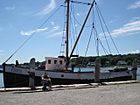 |
dragger | 40 ft | 1926 | The Florence is a "dragger" boat built in 1926. She used to drag a net along the bottom of Long Island Sound to catch fish. Mystic Seaport got her in 1982. She is the only working dragger in a museum collection! Today, she takes students out to collect sea creatures. |
| Gerda III | 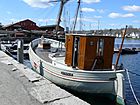 |
lighthouse tender | 40 ft | 1926 | The Gerda III was built in Denmark in 1928. During World War II, she bravely helped about 300 Jewish people escape from Nazi-occupied Denmark to Sweden. The Danish Parliament gave her to the Museum of Jewish Heritage. Mystic Seaport helps take care of her. |
| Joseph Conrad | 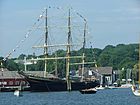 |
training ship | 111 ft | 1882 | The Joseph Conrad is named after a famous writer. She is a big sailing ship with an iron hull. She was used to train sailors in Denmark and even sailed around the world! Mystic Seaport got her in 1947. She still helps teach young people about sailing today. |
| Kingston II | 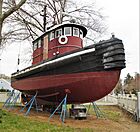 |
harbor tugboat | 44 ft | 1937 | The Kingston II is a tugboat that worked for the U.S. Navy for 42 years. She helped move submarines! She was built from scrap steel by people learning to weld. Mystic Seaport got her in 1980. |
| Nellie | 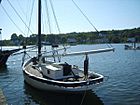 |
oyster or shoal-draft sloop | 36 ft | 1891 | The Nellie was built in New York and used to dredge for oysters in Long Island Sound. Mystic Seaport acquired her in 1964. |
| Regina M. | 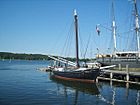 |
carry-away sloop | 45 ft | c. 1900 | The Regina M. was built around 1900. She was used to collect herring fish and take them to factories. Mystic Seaport got her in 1940 and restored her in 1992. |
| Roann | 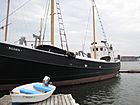 |
dragger | 60 ft | 1947 | The Roann is another "dragger" boat, built in Maine in 1947. She fished for flounder, cod, and haddock. Mystic Seaport got her in the 1970s and completely restored her in 2009. |
| Star | Fishing vessel | 34 ft | 1950 | The Star was built in Connecticut for catching swordfish and tuna. Mystic Seaport got her in 1976 and has done a lot of work to restore her. |
Images for kids
See also
- List of maritime museums in the United States
- List of museum ships
- Captain Joseph Warren Holmes
- Whaleboat
- John Faunce Leavitt, a former curator of Mystic Seaport.
 | Jewel Prestage |
 | Ella Baker |
 | Fannie Lou Hamer |


